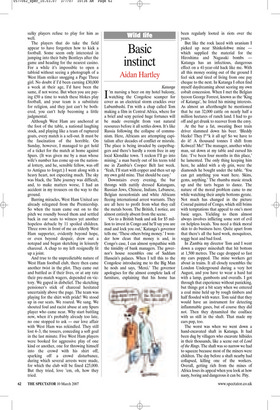Basic instinct
Aidan Hartley
Katanga
I’m nursing a beer on my hotel balcony, watching the Congolese scamper for cover as an electrical storm crackles over Lubumbashi. I’m with a chap called Tom making a film in Central Africa, where for a brief and sexy period huge fortunes will be made overnight from vast natural resources before it all settles down. It’s like Russia following the collapse of communism. Here, Africans are attempting capitalism after decades of conflict or misrule. The place is being invaded by carpetbaggers and there’s hardly a room free in any local Klondike town. ‘I reckon I’ll go into mining,’ a man barely out of his teens told me in Zambia’s Cooper Belt last week. ‘Yeah, I’ll start with copper and then set up my own gold mine. That should be easy.’ Downstairs every evening, the bar throngs with nattily dressed Katangans, Russian Jews, Chinese, Indians, Lebanese, Belgian neocolonials and white Africans fleeing international arrest warrants. They are all here to profit from what they call the metals boom. The British, I notice, are almost entirely absent from the scene.
‘Go to a British bank and ask for $5 million to invest in Congo and he’ll say you are mad and lock you out,’ Katanga’s governor tells me. ‘These others bring money.’ I wonder how clean that money is and, in Congo’s case, I can almost sympathise with the timidity of bank managers. The governor’s house resembles one of Saddam Hussein’s palaces. When I tell this to the Congolese introducing me to the Big Man he nods and says, ‘Merci.’ The governor apologises for the almost complete lack of furniture, explaining that his home has been regularly looted in riots over the years.
But like the rock laced with uranium I picked up near Shinkolobwe mine which supplied the material for the Hiroshima and Nagasaki bombs Katanga has an infectious, dangerous effect on a 41-year-old hack like me. With all this money oozing out of the ground I feel sick and tired of living from one pay cheque to the next. In Katanga I often find myself daydreaming about scoring my own cobalt concession. When I met the Belgian tycoon George Forrest, known as the ‘King of Katanga’, he listed his mining interests. As almost an afterthought he mentioned that he ran 32,000 cattle on nearly half a million hectares of ranch land. I had to go off and get drunk to recover from the envy.
At the bar a fat, sweating Boer train driver slammed down his beer. ‘Bleddy blecks! They f**k it all up! So we have to do it! A thousand tonnes I shift from Kolwezi! Me!’ The manager, another white man, sat down at my table and cursed his fate. ‘I’ve been four months in this place,’ he lamented. The only thing keeping him here, he added with a sly grin, were the diamonds he bought under the table. ‘You can get anything you want here. Skins, gems, anything.’ The rhumba music struck up and the tarts began to dance. The nature of the moral problem came to me while watching their ample bottoms gyrate. Not much has changed in the picture Conrad painted of Congo, which still brims with temptations that appeal to one’s most basic urges. Yielding to them almost always involves inflicting some sort of evil on helpless locals. You need a thick moral skin to do business here. Quite apart from that there’s all the hard work, mosquitoes, soggy heat and bad food.
In Zambia my director Tom and I went down a copper mineshaft that hit bottom at 1,500 metres. The cage dropped so fast my ears popped. The mine workers get about in trains. It all closely resembles the London Underground during a very hot August, and you have to wear a hard hat with a lamp, gumboots and overalls. I got through that experience without panicking, but things got a bit scary when we entered a coal mine held up by rough timbers and half flooded with water. Tom said that they would have an instrument for detecting inflammable gases, but of course they did not. Then they dynamited the coalface with us still in the shaft. That made my ears pop, too.
The worst was when we went down a hand-excavated shaft in Katanga. It had been dug by villagers who excavate hillsides in their thousands, like a scene out of Lord of the Rings. The shaft was so narrow we had to squeeze because most of the miners were children. The day before a shaft nearby had collapsed, killing one of the workers. Overall, getting rich from the mines of Africa loses its appeal when you look at how nasty, boring and dangerous it can be. Pity.


























































































 Previous page
Previous page